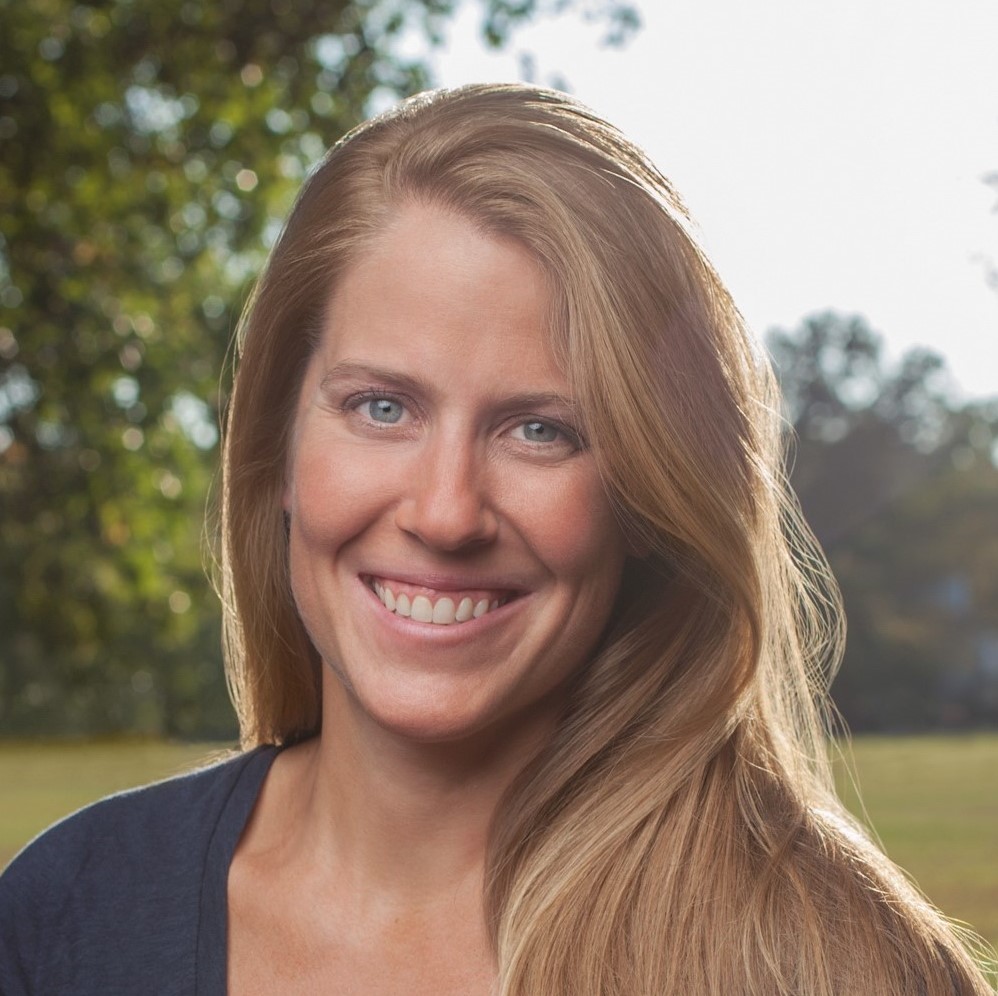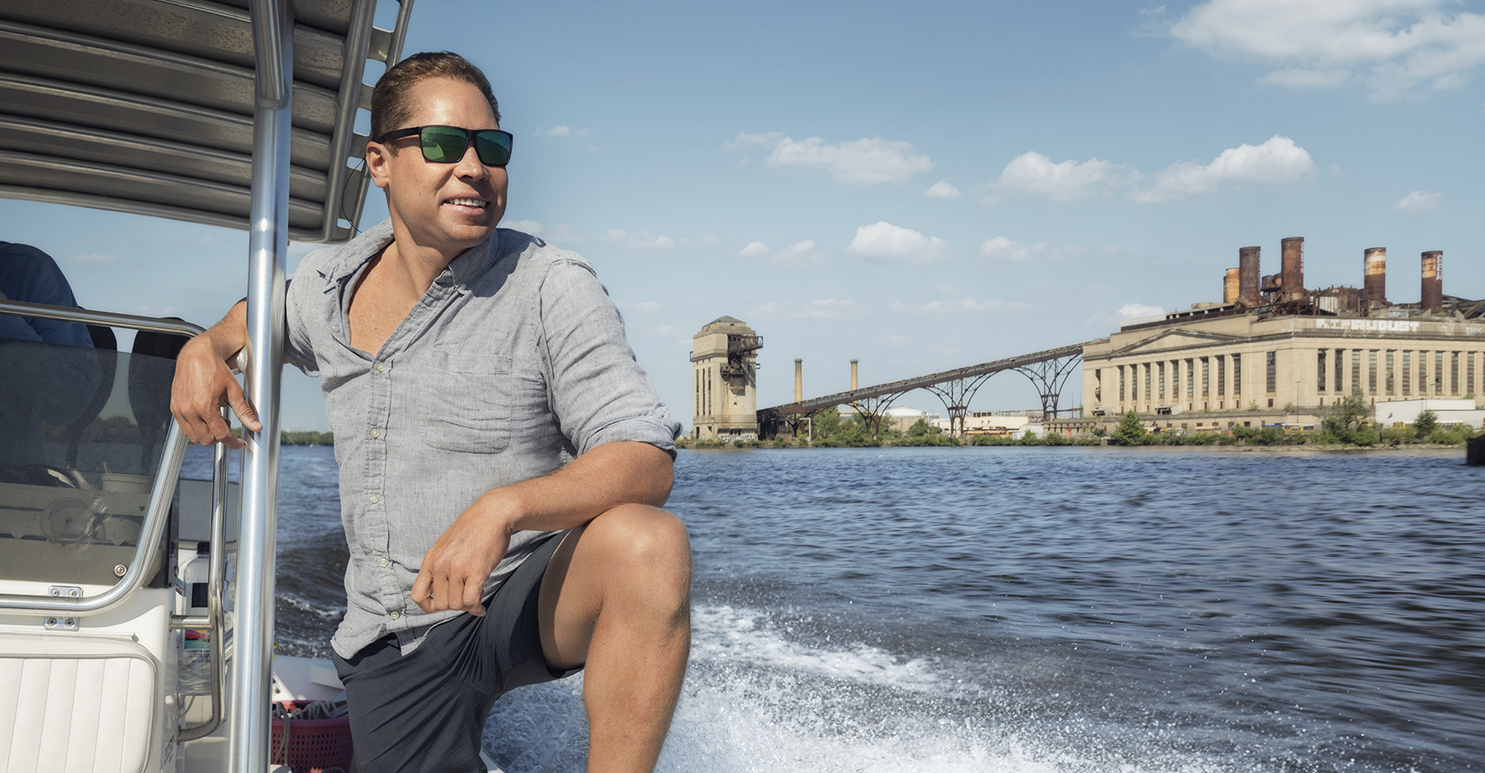
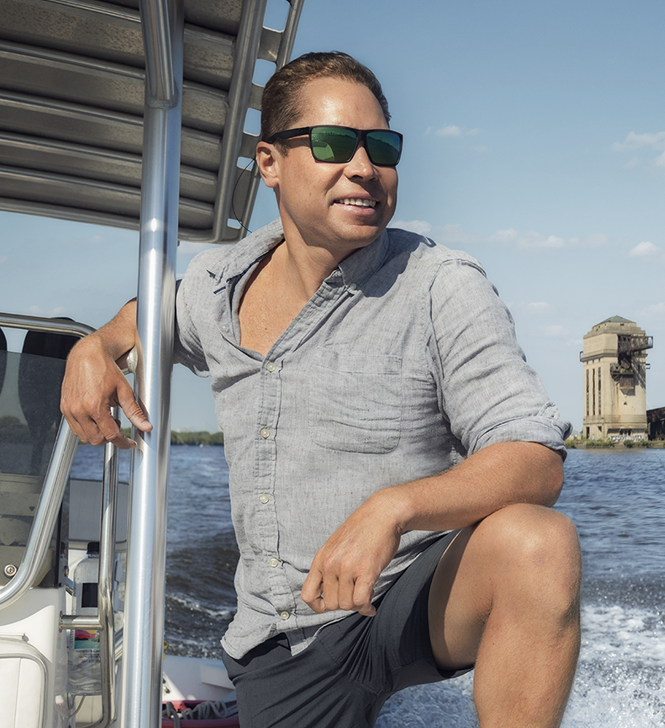
Upstream Rising
Through his work with the nonprofit Upstream Alliance, Zack Hoisington '07 is reconnecting urban communities with the water that runs through them.
It’s tough to track down Zack Hoisington ’07. It’s not like you can catch him in his office, because his office is often outside and sometimes not even on dry land.
Hoisington is the director of advancement and experiential education at the Upstream Alliance, a nonprofit working to improve coastal resiliency, clean water, and public access to water. Based in Annapolis, Maryland, the organization focuses on watersheds around the mid-Atlantic from Flushing Bay in New York to the Chesapeake and Delaware bays, including the Brandywine and Delaware rivers.
“Environmental stewardship is rooted in the experiences that we have,” Hoisington says. “What Upstream Alliance is doing is providing experiences to people so that they can learn to love the resources and have a greater impact in the wider community.”
Working in and conserving the outdoors was a passion Hoisington realized when studying biology at Colorado College. But the seed of environmentalism was planted at Lawrenceville when he took a course in nature writing, which included a canoe trip in the Pine Barrens in southern New Jersey. Now, with Upstream Alliance, he is part of an organization that works to help waterways, particularly urban waterways that were once heavily polluted, by bringing people to the water to see the opportunities there and what those waters are really like today.
“Changing the cultural norms is a big step towards improving the river,” Hoisington says. “Getting more people onto the water is one of the ways we do that.”
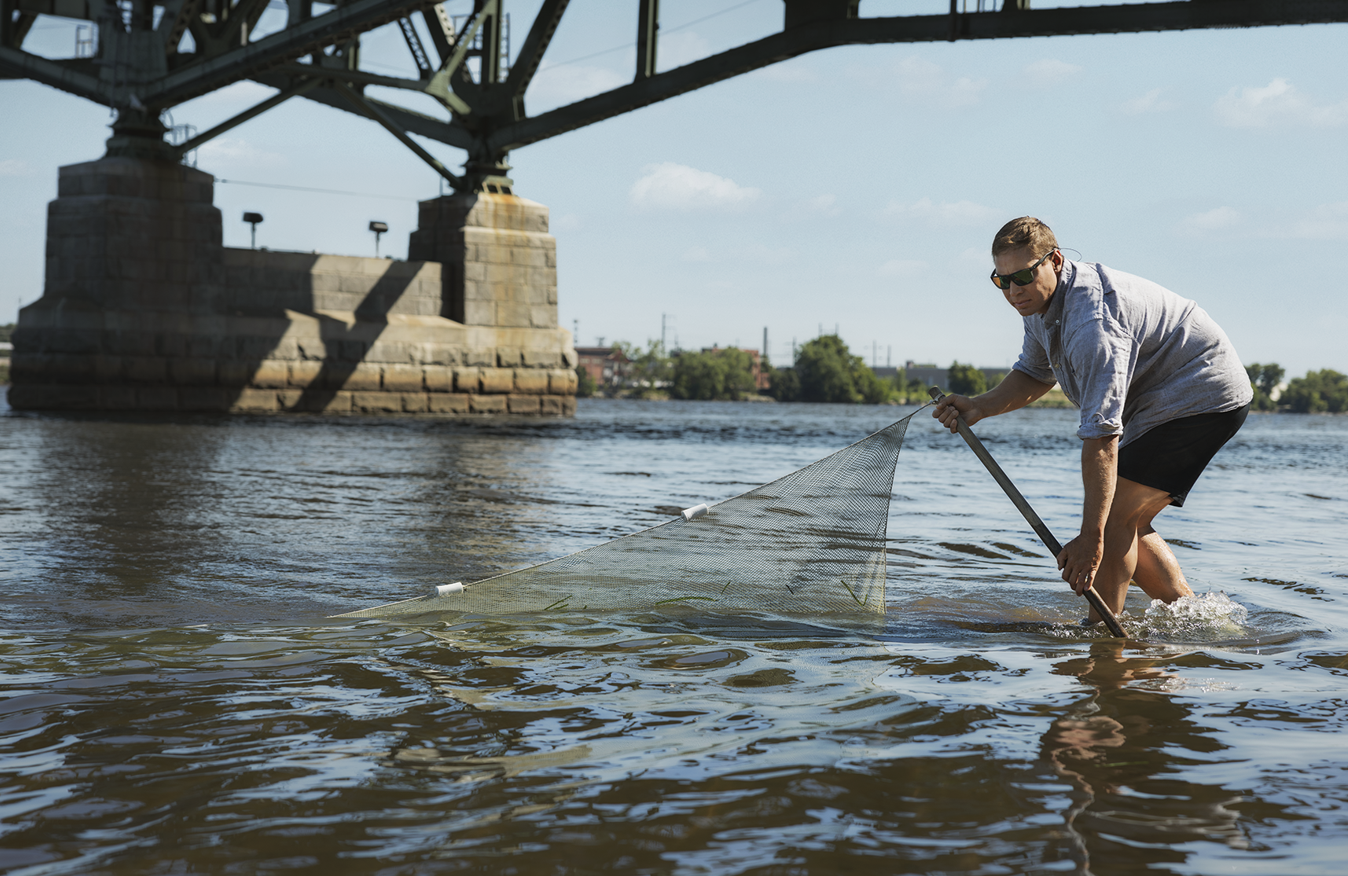
Hoisington, who grew up in Northern Virginia, came to Lawrenceville as his father, Jeff Hoisington ’77 P’07, uncles Rich Hoisington ’74 and Tim Hoisington ’81, and grandfather Richard Hoisington’47 P’74 ’77 ’81 GP’07, had before him. He played football and lacrosse and participated in Periwig before heading to the foothills of the Rockies to study biology and play lacrosse. He began working in outdoor recreation, including leading camping trips for kids in Hawaii, and then working as a fly-fishing guide in Aspen.
“I didn’t know how much money I was going to make living out of a tent,” he says, “until I got my feet under me and started getting pretty good.”
In 2013, Hoisington moved back east and started getting involved in conservation, beginning with the University of Maryland Center for Environmental Science, where he worked as a faculty research assistant on large-scale oyster restoration. Oysters are being used to clean up the Chesapeake Bay, as they filter algae, sediments and other pollutants, helping create a habitat for fish, crabs, and other bay life.
“That got me reconnected with the bay and to pursue this lifelong interest in these waterways we have in the mid-Atlantic,” he says.
That led him to teaching science at The Gunston School, which is also located on the Chesapeake Bay. Hoisington led bay studies programs and eventually became co-director of the Chesapeake Watershed Semester, a 15-week program in which day school students help solve some of the world’s most complex environmental problems.
‘Those cities are there because of the river, and in the last century there’s been this disconnect due to pollution,’ Hoisington explains. People there grew up being told: Don’t go near the water.
In 2022, Hoisington joined Upstream Alliance, where his work has focused on the Delaware Watershed and reconnecting urban communities, including Camden, New Jersey, and nearby Philadelphia, to their water.
“Those cities are there because of the river, and in the last century there’s been this disconnect due to pollution,” Hoisington explains. People there grew up being told: Don’t go near the water.
It’s not surprising given how dirty these rivers once were, including Cooper River in Camden, a 16-mile tributary of the Delaware River in Southern New Jersey. Before the passage of the Clean Water Act in 1972, about 40 percent of the river was raw sewage. But aggressive action taken to clean up the river by the Camden County Municipal Utilities Authority improved water quality by 90 percent, according to a Camden County official. It’s now the home of the Camden County Boathouse and a yacht club, and it hosts the Dad Vail Regatta, a national collegiate rowing competition that for years held residence on Philadelphia’s Schuylkill River. Its surrounding parks and trails are packed with walkers, runners, cyclists, and picnickers, or anyone looking simply to enjoy nature.
“It’s not at the point where we want it, but it’s way better than it was, and it’s only going to keep getting better once we get more people on the water,” Hoisington says of the Cooper River. “You’re going to see this inflection point where the river starts exponentially getting better.”
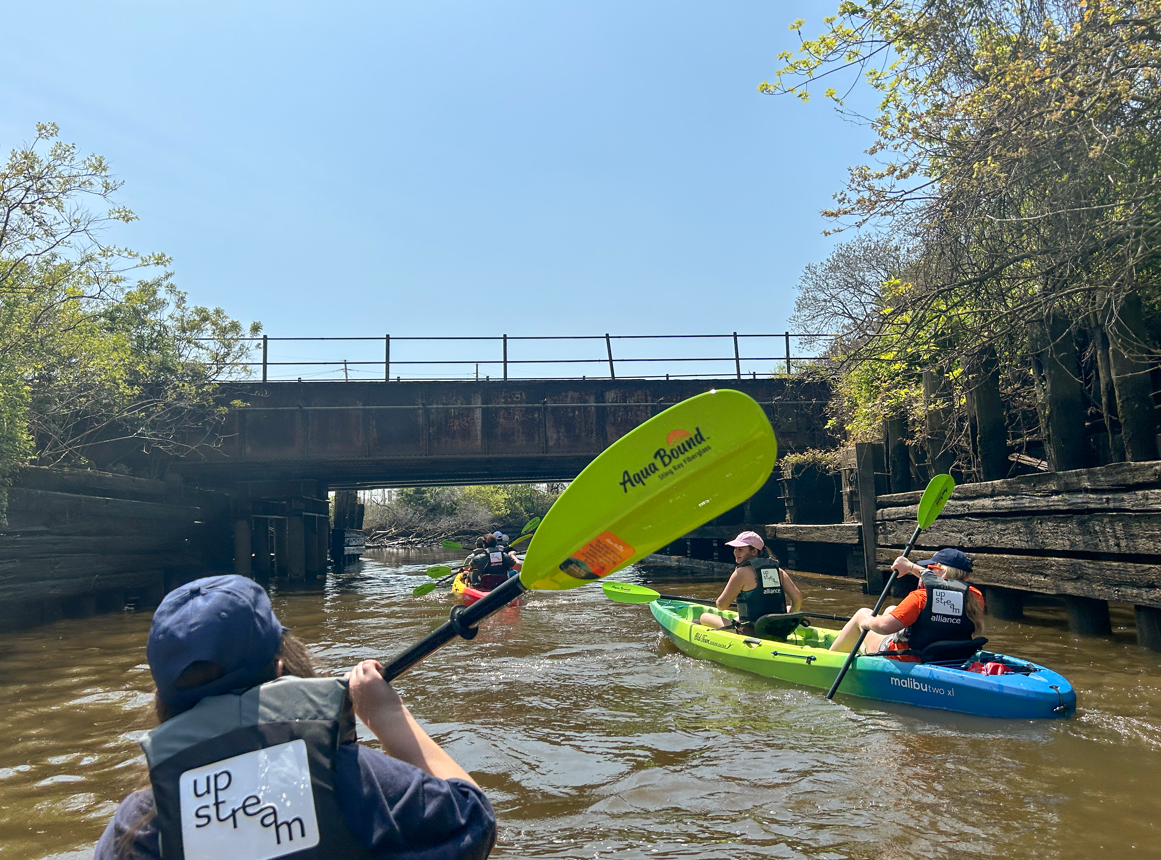
Last spring, eleven Lawrenceville students paddled on the Cooper River for two hours on a tour led by Zack Hoisington ’07 and Margarita Olivencia, Upstream Alliance’s director of Camden Education.
As part of that work, they are bringing groups of people out onto the water. They include politicians and others who can influence water policy, such as U.S. Rep. Donald Norcross and Philadelphia mayor Cherelle Parker.
“The first thing I remember her saying was ‘I really want to learn how to fish,’” Hoisington says of Parker, a Philadelphia native whose term began this year. “We want people of influence to have a positive experience on the water, where they see the value in usable waterways.”
Perhaps more important, Upstream Alliance is bringing groups of school children, including those from the surrounding urban school districts, onto the river to help overcome stereotypes and possible fears of the river being a dirty and dangerous place.
“As growing environmental leaders, it’s important to learn about the issues that our resources face,” Hoisington says, “but also learn to love the resources themselves.”
Changing the cultural norms is a big step towards improving the river. Getting more people onto the water is one of the ways we do that.
In 2022, Upstream Alliance took a group of Camden teenagers, along with a photographer from National Geographic, on a six-day exploratory trip to find the source of the Cooper River, kayaking during the day, and paddling back to a base camp in Camden at night. More recently, Hoisington hosted Lawrenceville students on a paddling trip.
“Some of them had never been kayaking,” said Stephen Laubach H’03 P’23 P’27, Lawrenceville’s Aldo Leopold Distinguished Teaching Chair and director of sustainability. This past spring, eleven students paddled on the Cooper River for two hours, along with Hoisington and Margarita Olivencia, Upstream Alliance’s director of Camden Education. They saw green space, ospreys, turtles, and herons, but they also learned about the history of the river by paddling to a floating lighthouse that now hosts an osprey nest atop of one of its masts. Laubach says the young Lawrentians were stirred by the experience.
“It was inspiring to our students to see these people looking at a spot that was a little forlorn and hearing these two people sell a vision for what this place could be, and take back this waterway that had been taken over by industry and abandoned,” he says.
Hoisington says Upstream Alliance hopes to bring 2,500 students a year onto the river.
“Eventually our goal is that every student in the Camden public school system gets at least one experience on the water,” he explains. Upstream Alliance currently charters boat trips for about 200 students, so to reach its 2,500-student goal, the organization is building its own 49-foot, solar-powered craft, Firefly, which Hoisington said will be ready for student trips in spring 2025. The American Water Charitable Foundation donated $250,000 to the cause last year.
Laubach says Hoisington’s work is inspirational, not just to the communities in which he works, but to Lawrenceville students too.
“It’s a message to our students that there are other pathways besides the more traditional ones that our students might end up pursuing,” he says.
Hoisington said this work has also changed his view of the world and nature and what and where nature can be.
“I grew up in an urban area and was lucky enough to be able to leave the city and seek out these pristine places that were as untouched as possible,” he says. “Since I started with Upstream Alliance, I’ve really changed my perspective on what it means to have nature in your life, and where you can find it.”
* * *
Based in Audubon, New Jersey, Jen A. Miller is the author of Running: A Love Story.
